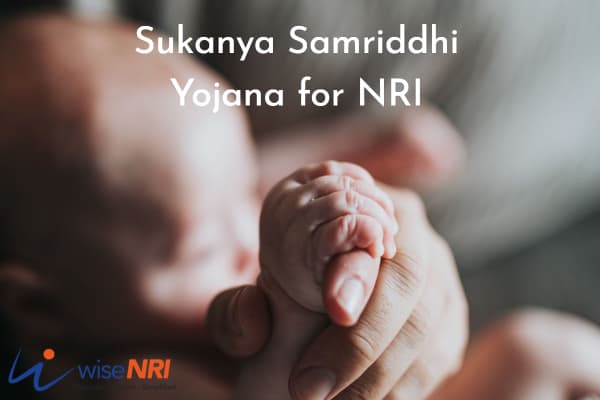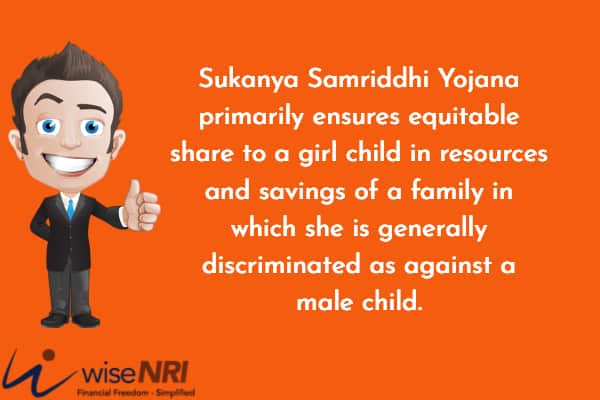Non-resident Indians are very well connected to India in more than one way. Most of them have close familial ties back home, especially among the first and second-generation Indians. They celebrate and enjoy the rich Indian heritage, culture, food, clothes, dances, songs, and other art forms. NRIs are very fond of Indian movies including in Hindi, Telugu, Tamil, and Bengali.
One of the most common ways to stay connected with India is their investments for long-term goals. Investing in India is not only an emotional decision a rational one financially.

Must Read – PPF for NRI
Why NRIs prefer to invest in Indian Debt
Some of the most common reasons for investing in long-term fixed-income schemes in India are:
1. Higher Education
Like all Indian parents, they want to save and invest adequately to finance the higher education of their children – whether in India or abroad. With the effective inflation in higher education touching 10% or double than the CPI, they wish to start early.
2. Marriage of Daughter
Another reason among parents is the traditional mindset of giving the daughter in marriage. They wish to spend a fortune in the weddings of their princesses and therefore need to invest as soon as a daughter is born.
3. Paucity of Rewarding Alternatives
There are a few safe investment avenues in developed countries like the USA, the UK, European Union countries, Singapore, Middle East. In most of these countries the base rates, as declared by their central banks, are near an all-time low of 0.0% to 0.25%. Compare this to the 4% repo rate of the RBI. The banks and financial institutions add a markup on this rate to offer long-term depositors.
4. Multiple Benefits
Some of the safest long-term small-savings schemes in India are issued and backed by the Government of India. Most of these savings schemes are very efficient when it comes to taxation and therefore are immensely popular. Some of these schemes are:
- National Savings Recurring Deposit Account Scheme
- National Savings Time Deposit Account Scheme
- National Savings (Monthly Income Account) Scheme
- Senior Citizens’ Savings Scheme
- National Savings Certificate
- Kisan Vikas Patra Scheme
- Public Provident Fund Account
- Sukanya Samriddhi Account Scheme
All the above schemes mobilize the savings of Indian citizens in government infrastructural projects. The Government of India gets access to long-term access to capital while offering better returns and tax benefits to depositors.
Sukanya Samriddhi Yojana for NRI
The Sukanya Samriddhi Account Scheme (SSA) or Sukanya Samriddhi Yojana (SSY) was launched by Prime Minister Sh. Narendra Modi on January 22, 2015, as part of his “Beti Bachao, Beti Padhao” (Save the Girl Child, Educate the Girl Child) social campaign. The official statement at the time of the launch stated, “The scheme primarily ensures equitable share to a girl child in resources and savings of a family in which she is generally discriminated as against a male child.” A noble idea with groundbreaking ramifications indeed.
To make the scheme attractive and popular among parents of girl children, the rate of interest in the year of the launch was 9.1%, among the highest in the small-savings schemes at the time. even after the interest rates saw historic lows of under 5% on long-term deposits, the interest on SSY is still at 7.6% as of December 30, 2021.
To further sweeten the deal, the government offers EEE (Exempt-Exempt-Exempt) tax benefits. You get a tax-deduction on making regular investments, no tax on the accrued interest income, and finally no tax on maturity withdrawal.
All the above factors make SSY one of the most attractive small-savings schemes targeted for the benefit of the girl child.

Must Read – Pravasi Pension Scheme for NRIs
Key Features of SSY
- Deposit limit per financial year: Minimum ₹250/- and Maximum ₹1.5 lakhs. The minimum deposit limit was ₹1,000/- before 2019.
- Eligibility: In the name of a girl child between 0 and 10 years.
- Account Term: 21 years from the date of account opening.
- Premature withdrawal: To meet the higher education expenses of the account holder.
- Premature Closure: If the account holder gets married after attaining 18 years, then the account can be closed.
- You can open an SSY account at Post Offices and Authorized Bank Branches.
- You can transfer the SSY Account to any post office or bank branch across India.
- Tax benefit
- Deduction of up to ₹1.5 lakhs u/s 80C of the IT Act.
- No tax levied on interest accrued on deposit.
- No tax is applicable on withdrawal on maturity, for meeting higher education expenses, or after marriage.
- The current rate of interest is 7.6% p.a.
SSY for NRIs
Now that we know that the Sukanya Samridhhi Yojana is one of the best schemes, the next question is how do you as a parent open an SSY account for your girl child?
The answer is not straightforward. There are a few criteria, as far as the residential status of your girl child is concerned. Most likely, all your children are living with you, especially if you are living abroad for a long time. it also quite likely, that your children were born in your country of residence and have that country’s nationality by default. In that case, your child would be called either a PIO (Person of Indian Origin) or an OCI (Overseas Citizen of India).
Being a PIO or an OCI means that you are recognized for your Indian roots, but you are not an Indian citizen. You still hold a passport of some other country. Being a PIO and an OCI makes you eligible for some benefits and relaxation with regards to capital control and investments, but not all avenues are open to you.
You can open an SSY account in the name of your daughter only if:
- You, your spouse, and your daughter are all Indians and reside in India.
- You or Your spouse are not Indians, your daughter is an Indian, and you all reside in India.
- You or Your spouse are not Indians and do not reside in India, but your daughter is an Indian and she resides in India.
The keyword here is that the girl child must be an Indian citizen residing in India. The scheme is so restrictive, that when you and your girl child become an NRI, the SSY account in her name is deemed to be closed and you will no longer earn interest on it.
It is mandatory to inform the post office or the bank branch within one month about the change in the citizenship and/or residential status of the girl child. Therefore, if you are going abroad to settle, you should withdraw the entire sum.
We may wish that the government changes the rules and allow NRIs to open the SSY account, just like they can open PPF accounts.
Please share your experience of Sukanya Samriddhi Yojana – in case you invested in this when you were a resident Indian

My daughter has SSY account, but now she has moved abroad. Can we close the SSY account and withdraw the amount in the account?
Hi Dion,
If your daughter has moved abroad and is now a non-resident, the SSY account should be closed. As per the rules, NRI girls are not eligible, and the amount can be withdrawn with applicable interest and the closure process.
If a girl born in USA for indian parents, is she eligible for SSY scheme?
SSY account in India. Girl child is now 2 years abroad. Is she an NRI?
Hi Parveen,
Yes, if the girl child has been living abroad for two years, she is considered a Non-Resident Indian as per Indian tax and residency laws.
Sukanya samriddhi yo. Form send sir
Hi Rahul,
To open a Sukanya Samriddhi Yojana account, you can visit a post office or authorized bank, fill out the account opening form, and submit necessary documents like the child’s birth certificate and parents’ ID proof.
I have a Sukanya Samruddhi Yojana account for my 4 yearn old. Now i and my family are relocating abroad. What will be the implications on the SSY account?
I am NRI, shall i start SSY for my child in india.
Do NRI allowed to invest ssy?
I will move abroad in next March 2024. My 2 daughters have Sukanya Samriddhi Yojana account from last 2 years . What i need to do for them. Can i continue it
My twin daughters born 05/12/2012 in Qatar can we open Sukanya Samriddhi Yojana
I am a resident of India and i have SSY account for my daughter .Its been 6 years im investing in it.But next year we are moving to U.k for better prospects.I and my daughter will be still indian passport holders.Even then will i have to close my account.
We are staying in uk, can we eligible for SSY SCHEME for our daughter in India
I want to know if we can continue Sukanya smridhi yojna account for our daughter. We are indian citizens and my daughter is also citizen of india. We are living overseas since last 4.5 years
Sukanya samrudhi yojana account was open 5 years ago but 2 years ago i became nri. Can i still continue the account…?
I want to open ssy for my daughter
I have deposited 1.5 lakhs every year for 8 years in Sukanya Samriddhi and now I am moving overseas with family. Can I withdraw the amount and will it taxable ?
Do we have any savings in India for baby boy born abroad
Can i do ssy i m in japan i have 2 daughter i m indian
My daughter was born in Nepal. And holds Indian passport..
I’m an Indian working in Nepal. My wife is a Nepali and my daughter hold Indian passport. We all currently residing in Nepal. Is my daughter eligible for SSY?
My daughter has an SSY account, now she turned NRI. Can I close the account and get back the amount so far deposited?
My daughter is 2years 6 months old she is NRI. So is it possible to open shukanaya account for her?
can i (NRI) join sukunya samridhi acount for my daughter?
i started sukanya for my daughter when she is 6 year old, now we migrated to UK . we are trying for uk citizenship. if we got citizenship in uk what will happen to our sukanya account, is she able to withdraw the money when she turns 18. thank you
My daughter is born in france , her nationality is indian, her parents are all indians. but we all residing in france. Is my daughter is eligible to open ssy account?
My daughter born in Malaysia in 2020 later we shifted to uk now we are living in uk, can we do ssy for my daughter
Can NRI invest in Sukanya Samridhi yojna?
I appreciate blog posts such as this one. I will surely follow a few of them. Keep writing such detailed blogs. Those are some excellent summary and good Share.
Thanks 🙂